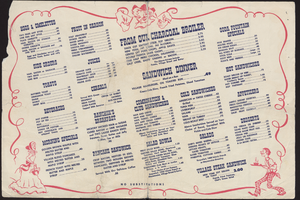Search the Special Collections and Archives Portal
Search Results
Las Vegas, Nevada Strip Hotel Labor Relations Collection
Identifier
Abstract
The Las Vegas, Nevada Strip Hotel Labor Relations Collection comprises legal documents, correspondence, and human resources manuals and pamphlets related to labor in the hospitality industry on the Las Vegas Strip in Nevada from 1963 to 2008. The majority of documents involve the Culinary Union, the Bartenders Union, the Teamsters Union, MGM Mirage affiliated hotel casinos, the Dunes Hotel, and the Sands Hotel and Casino.
Archival Collection
Southern Nevada Chapter of the American War Mothers Organization Records
Identifier
Abstract
The Southern Nevada Chapter of the American War Mothers Organization Records (1947-1995) are comprised primarily of scrapbooks containing correspondence and minutes, numerous newspaper clippings, and photographs. Also included are pamphlets on American War Mothers organizational rituals, bylaws, history, ceremonial ephemera, flags, and a Henderson Chapter Charter. The materials also contain items relating to the North Las Vegas Chapter, the Rose Garden Chapter, and the State Chapter.
Archival Collection

Sonny V. Mallari oral history interview: transcript
Date
Archival Collection
Description
Oral history interview with Sonny V. Mallari conducted by Chanele Mallari on November 26, 2021 for Reflections: The Las Vegas Asian American and Pacific Islander Oral History Project. Sonny Mallari talks about his childhood in Masantol, Pampanga province, Philippines with his five siblings. He discusses his family's immigration to Salinas, California and details of his life and parents' lives in the United States. Sonny shares stories of being bullied in school and what the immigration process was like from his point of view at the age of seven. He also talks about his professional work as a cook, moving to Las Vegas, Nevada for work, and becoming a Culinary Workers Union member.
Text

Alpha Kappa Alpha Sorority 75th Far Western Region conference materials
Date
Archival Collection
Description
From the Alpha Kappa Alpha Sorority, Incorporated, Theta Theta Omega Chapter Records (MS-01014) -- Chapter records file.
Text
Bill Schafer Papers
Identifier
Abstract
The Bill Schafer Papers (1980-2018) contain personal and professional papers of Las Vegas, Nevada journalist and publisher, Bill Schafer, and photographs from various LGBTQIA+ related events in Las Vegas. The materials include files related to Schafer's work managing the
Archival Collection
Robert Lang Professional Papers
Identifier
Abstract
The Robert Lang Professional Papers (1976-2020) mainly contain urban planning research and reports from former University of Nevada, Las Vegas (UNLV) professor and public policy expert Robert Lang. Materials represent different public policy related projects and issues Lang worked on when he was employed with the Fannie Mae Foundation in Washington, D.C., and Brookings Mountain West and the Lincy Institute at UNLV. Materials also include Lang's teaching files which include course syllabi, class presentation slides, and course readers. Research, notes, and drafts of Lang's books including
Archival Collection
Howard Hughes Professional and Aeronautical Photographs
Identifier
Abstract
The Howard Hughes Professional and Aeronautical Photographs contain black-and-white photographs of businessman and entrepreneur Howard Hughes and his companies from 1916 to 1997. The photographs primarily depict Hughes alongside his aircraft, including the XF-11 prototype reconnaissance plane and the HK-1 Hercules, better known as the "Spruce Goose" or "Flying Boat." The photographs also cover the companies owned by Hughes, including Hughes Tool Company, Hughes Aircraft Company, Hughes Electronics Corporation, and RKO Pictures.
Archival Collection
The Story of Classic Las Vegas Oral History Interviews
Identifier
Abstract
Archival Collection

